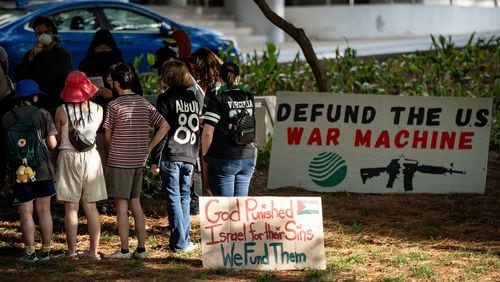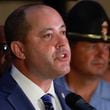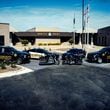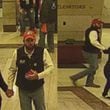On Thursday, a white-haired law enforcement veteran stood before an auditorium packed with police brass and preachers to say he had grown tired.
Ken Vance became increasingly emotional. He was tired of cops driving around talking on cellphones, of not getting out to “talk to that woman on the porch,” of a “warrior” mentality common in many police circles.
“Stand up and help someone,” he urged fellow officers in his red clay twang. “We have to teach people how to talk to each other again.”
Vance is no criminal coddler; he has 42 years in the business and heads the state’s police training agency.
The meeting at the Carter Center was the kickoff for an effort to partner metro Atlanta police forces with houses of worship. The aim? To win over the trust of residents they are sworn to protect and serve.
The meeting carried a “we’re-all-in-this-together” theme and was organized by the Rev. Markel Hutchins, who over the past decade has transformed his image from a preacher looking for a protest to a man partnering with local chiefs.
The long-planned meeting occurred in the wake of two black men dying — on video — at the hands of police in Louisiana and Minnesota. That was coincidental, but it underscored the point — police must build bonds with the communities.
It was a message we have heard before, but it’s worth repeating. The attendees left happy and chattering, feeling they might be onto something that might foster some good.
Then, hours later, a gunman enraged by the deaths of black civilians at the hands of police went on a murderous spree in Dallas, killing five cops and wounding seven more. The shooter, Micah Xavier Johnson, targeted a protest over the death of two men who had died at police hands.
Dallas police, not wanting to appear like the warrior cops at the Ferguson protests, took a friendlier approach to engaging demonstrators. They donned their summer service uniforms, not riot gear, and posed for pictures with marchers. And then they were systematically murdered.
The attack highlighted the fine line cops must traverse as public servants who can be involved in a firefight in a heartbeat.
On Friday, I called Vance to see if his feelings had changed.
They hadn’t.
“Protect and serve means a lot to me; let’s quit grouping ourselves as guardians, as warriors, as sheepdogs or whatever the current vernacular is,” Vance said. “We have a duty — and I’m big on duty. It’s all about responsibility, about courage, about humanity, about service — there goes that service thing again.”
He said training to “de-escalate” situations is increasingly instilled in officers and they’re getting better at it.
Still, it gets more difficult to attract good candidates, he said: “We are paid like janitors to act like rocket scientists, judges and juries in a split second.”
College Park Police Chief Keith Meadows, who spoke at the meeting, said Friday his views hadn’t changed either.
“It’s easy for us to revert to that feeling of ‘us versus them,’ ” he said. “I keep telling officers we’re not coming in as an occupying force.”
“It takes a lot more courage to embrace the guardian mindset of public safety,” he said, than that of a warrior.
Meadows spent 30 years with Atlanta police before taking the helm at College Park last year. He has tried to instill a spirit of professionalism, of getting cops to seek more schooling “because officers with college degrees get fewer (office of professional standards complaints).”
“You have to ask, ‘Are our policies and procedures instilling faith in the community?” he said. “It’s got to be different. We really can’t keep doing it the same way.”
Police increasingly have a tougher job because of a distrust inherent in segments of the public and because every move they make is scrutinized by digital technology, putting pressure on higher-ups to act, often against them.
Rev. Hutchins urged police not to personalize a public attitude that is often against them.
“We are dealing with a generation of people who do not respect authority,” he said. “They don’t respect authority in school. They don’t respect authority in their homes.”
And, Hutchins told the preachers, “The only way to hold someone accountable when they are wrong is to support them when they are right.”
Recently retired Atlanta detective Ken Allen said policing hasn't changed as much as the police themselves. Governmental cost-cutting has slashed pensions, which has forced an exodus of veteran cops and kept away good recruits.
“Law enforcement was a profession. Now people are looking at it as a job,” he said. “Now departments are trying to fill uniforms.”
Inexperience or a lack of a professional police mindset can cause incidents.
“A war mentality didn’t cause the officer in Minnesota to shoot the guy,” Allen said. “Fear seemed to do it.”
Investing more in cops, in the long run, is the right thing to do, Allen said, because “you can’t treat police like other (public jobs). There’s no one out there protesting firemen or sanitation workers. Why? We can take your freedom or can take your life.”
About the Author






